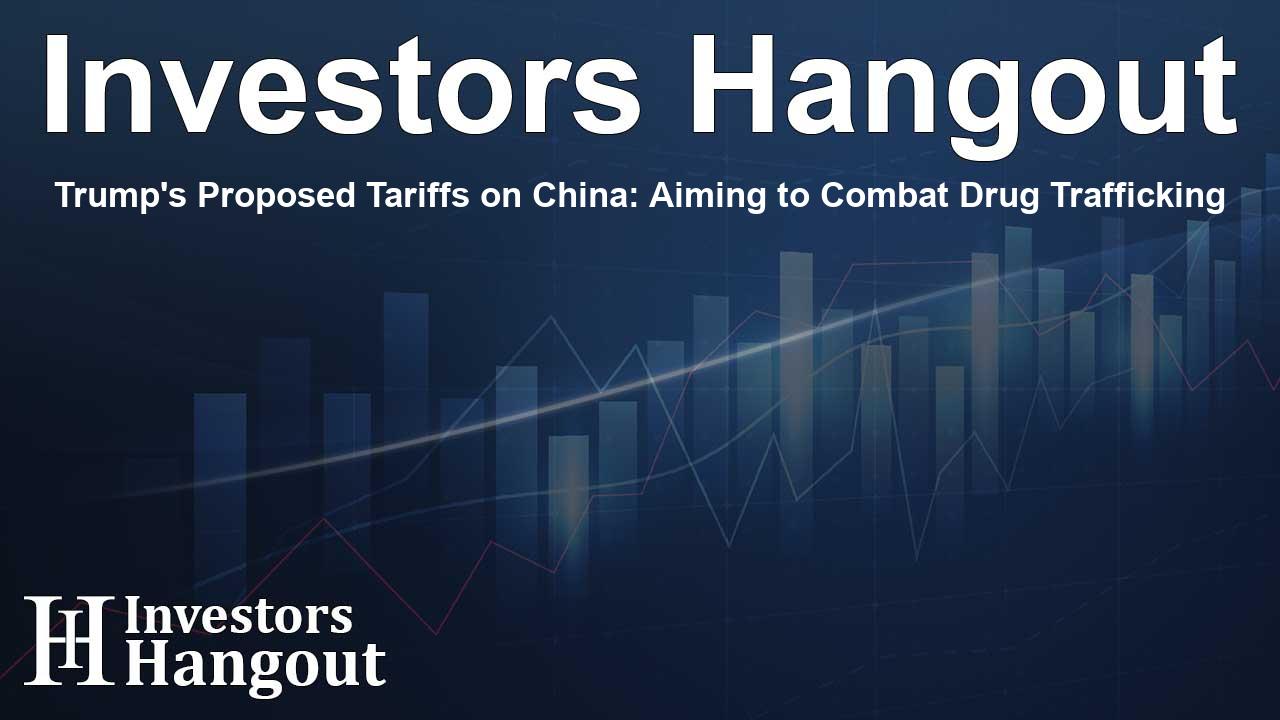Trump's Proposed Tariffs on China: Aiming to Combat Drug Trafficking

Trump Proposes New Tariffs to Tackle Drug Imports
In a recent announcement, President-elect Donald Trump stated his intention to impose a hefty additional 10% tariff on all imports from China. This action aims to pressure the Chinese government to take more significant measures against the inflow of illegal drugs, particularly fentanyl, crossing the border into the United States.
Through social media updates, Trump emphasized the discussions he has held with Chinese authorities regarding the urgent need to curb the drug supply. Despite numerous conversations, he expressed frustration that tangible progress has not been made, stating that narcotics continue to flood into the U.S. at unprecedented levels, predominantly via Mexico.
His firm stance includes charging China a supplementary 10% tariff on all its products transported to the U.S. This marks a potential escalation in trade tensions, especially given Trump’s prior threats of up to a 60% tariff on Chinese goods, igniting fears of a renewed trade war between the two powerhouse economies.
Tariffs on North America: Canada and Mexico Targeted Too
Additionally, Trump announced plans to impose a 25% tariff on all imports from Canada and Mexico. This initiative stems from concerns regarding illegal immigration crossing through these neighboring countries into the U.S.
Trump articulated his plans, asserting that these tariffs would feature as one of his first executive orders upon taking office. He indicated that these measures would remain until there is a notable decline in drug trafficking and illegal immigration issues he categorizes as an invasion.
These tariff proposals extend Trump’s ongoing agenda of protectionist trade policies, reminiscent of his administration’s previous efforts to increase import tariffs on various trading partners. His administration aims to create a more robust framework to confront and manage both drug trafficking and immigration concerns that he believes threaten national security.
The Implications of Tariffs on Trade Relations
Imposing tariffs can significantly impact international trade dynamics. While it is intended to deter drug trafficking, such measures may also lead to retaliatory tariffs from affected nations. The potential economic fallout could ripple through global supply chains, affecting not only prices for consumers but also businesses reliant on imports.
Proponents of the tariffs may argue that they serve as a necessary method to incentivize foreign nations to cooperate on critical issues like drug enforcement. However, critics warn that such protectionist policies might ultimately harm U.S. consumers and strain diplomatic relations.
Historical Context of Tariff Actions
The Trump administration previously engaged in escalating trade tensions with various countries, most notably China. The aim was to protect American industries and jobs by addressing trade imbalances. However, the broader economic implications of these tariffs raised questions about long-term impacts on both the U.S. economy and its global standing.
Understanding the historical context of these policies can provide insight into how current actions might evolve and influence international relations moving forward. As these tariffs are introduced, industry stakeholders and policymakers alike are closely monitoring how nations will respond and what this could mean for future trade negotiations.
Frequently Asked Questions
What are Trump's proposed tariffs on China?
Trump is proposing an additional 10% tariff on all Chinese imports to pressure China into controlling drug trafficking into the U.S.
What other countries are affected by Trump's tariff proposals?
In addition to China, Trump announced a 25% tariff on imports from Canada and Mexico due to immigration concerns.
When will these tariffs take effect?
Trump mentioned that his tariff initiatives would be included in his first executive orders upon taking office.
How might these tariffs impact consumers?
These tariffs may lead to higher prices for imported goods, affecting consumers and possibly leading to a broader economic impact.
What historical context should be considered regarding tariffs?
The Trump administration has a history of imposing tariffs as part of protectionist trade policies, which can alter global trade dynamics significantly.
About Investors Hangout
Investors Hangout is a leading online stock forum for financial discussion and learning, offering a wide range of free tools and resources. It draws in traders of all levels, who exchange market knowledge, investigate trading tactics, and keep an eye on industry developments in real time. Featuring financial articles, stock message boards, quotes, charts, company profiles, and live news updates. Through cooperative learning and a wealth of informational resources, it helps users from novices creating their first portfolios to experts honing their techniques. Join Investors Hangout today: https://investorshangout.com/
Disclaimer: The content of this article is solely for general informational purposes only; it does not represent legal, financial, or investment advice. Investors Hangout does not offer financial advice; the author is not a licensed financial advisor. Consult a qualified advisor before making any financial or investment decisions based on this article. The author's interpretation of publicly available data shapes the opinions presented here; as a result, they should not be taken as advice to purchase, sell, or hold any securities mentioned or any other investments. The author does not guarantee the accuracy, completeness, or timeliness of any material, providing it "as is." Information and market conditions may change; past performance is not indicative of future outcomes. If any of the material offered here is inaccurate, please contact us for corrections.